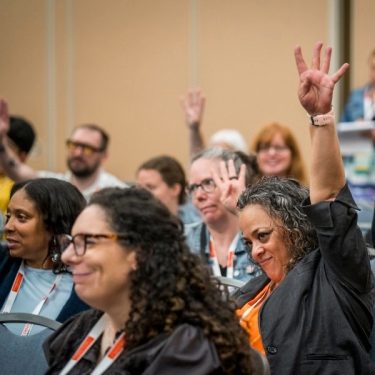Registration for NatCon 26 is now open — the sooner you book, the more you save.
Register Today!Attending a national conference as an associate clinical social worker was an incredible experience. In a challenging field like behavioral health, the opportunity to meet peers and share experiences can be deeply rejuvenating and, for me, necessary.
As I zipped up my suitcase, I smiled. I was about to fly across the country to learn, grow and represent myself in my current role. I carried with me a deep appreciation for my job, for the people who have supported me, and for my own hard work. That feeling stayed with me throughout the next three days at the National Council for Mental Wellbeing’s annual conference, NatCon.
Day One: Coffee, Nerves, Connection
With a much-needed iced coffee in hand, I stepped into the first day filled with a mix of excitement and nervous energy. I attended sessions on “Behavioral Health Needs of
Justice-involved Populations” and “Healing Trauma: The Power of Neurofeedback,” as well as a powerful TED-style Talk titled “The Tour of Grief: Navigating Loss, Love and the Power of Presence.” Each session left me more curious and inspired.
That day, I also had the chance to meet fellow candidates in my program and connect with Kaiser Permanente leadership — the very people who envisioned and created the National Mental Health Workforce Acceleration Collaborative, also known as the Accelerator. It was one thing to read about the program’s purpose; it was another to hear firsthand from people invested in our growth and in the future of mental health care. Their passion was contagious.
Day Two: A Moment I’ll Never Forget
I had planned to start the second day with some quiet reflection at a local coffee shop. Instead, I received a surprise invitation — to be part of a podcast episode highlighting the Accelerator program. I felt a rush of nerves but also gratitude for the opportunity to share my story.
I sat in an orange chair, heart pounding, as I was asked why I chose this field. “Why are you here?” they asked. The answer felt simple and deeply true — I’m here because I want to be who I needed when I was younger. As a former foster youth, my journey into this field is grounded in lived experience, and I carry that purpose with me in all that I do.
Later that day, I visited the exhibit tables and connected with professionals from various backgrounds. I gathered unexpected resources — from clinical note software to tools for substance testing, self-care and medication support. A session on “Scaling Coordinated Specialty Care for First-episode Psychosis” gave me insight into a population I currently support, deepening my understanding of their unique experiences and gaps in treatment.
Day Three: Impactful Endings
On my final day, I attended two standout sessions: “Supporting Voice Hearers in Crisis: Evidence-based Tools and Strategies” and “Transforming Trauma Into Triumph for Our Veterans.” These presentations were deeply personal, grounded in both research and lived experience. They reminded me why storytelling is such a powerful tool in our work.
By the end of the day, I felt a mix of wonder and sadness that the conference had come to an end. But I left feeling more connected to my purpose than ever before.
Final Thoughts: Reframing What I Thought Wasn’t Possible
I would never have had this opportunity without the Accelerator program. Before this, I often believed there were too many barriers — financial, logistical, emotional — for me to attend a conference like NatCon. But now, having attended and engaged so fully, I see that many of those “barriers” weren’t fixed. They were just fears.
This experience not only expanded my professional knowledge but also reminded me that I belong here. I’m committed to seeking out more opportunities like this, because growth doesn’t just happen in our comfort zone — growth happens when we dare to go beyond it.
Guest Author: Breanna Simental, BS, MSW

Breanna Simental, BS, MSW, is a Candidate Ambassador for the National Mental Health Workforce Acceleration Collaborative, a National Council program funded by Kaiser Permanente. This innovative program addresses the mental health workforce shortage by supporting candidates pursuing professional licensure. It is increasing the number of licensed clinicians available to serve clients across the country. To learn more about the program, visit our website.



